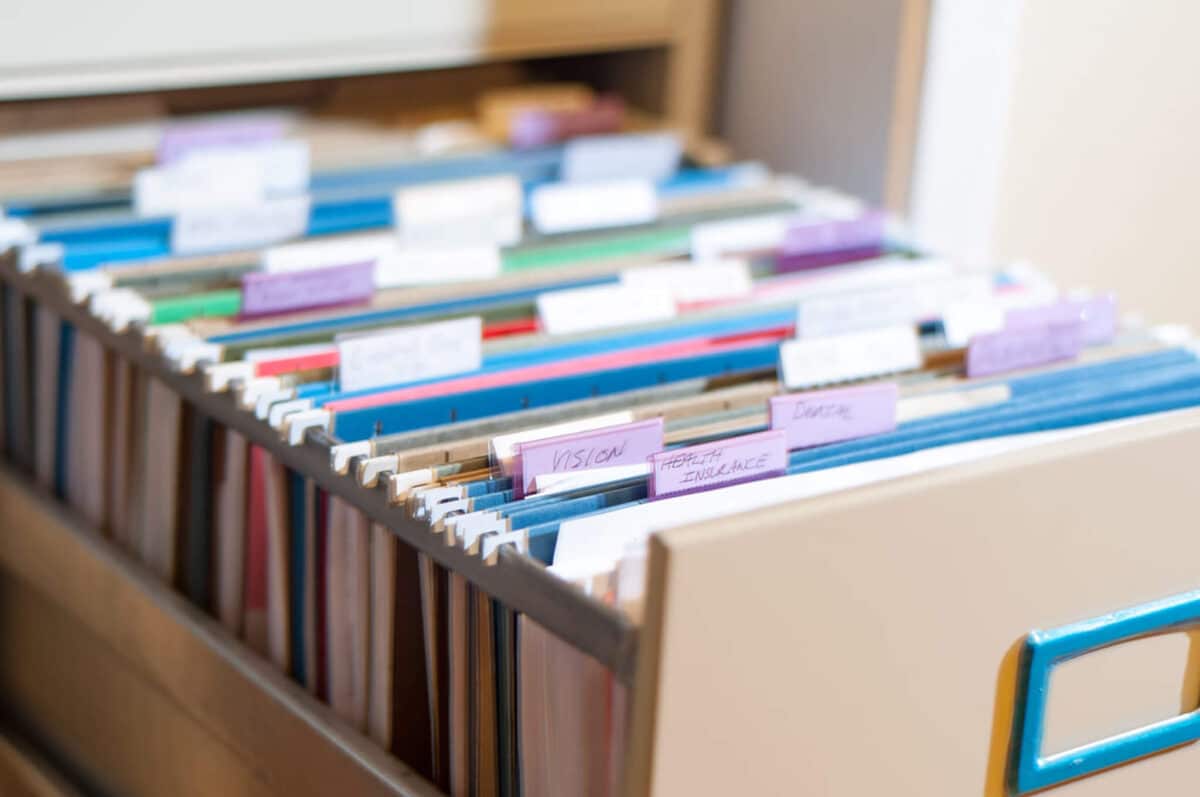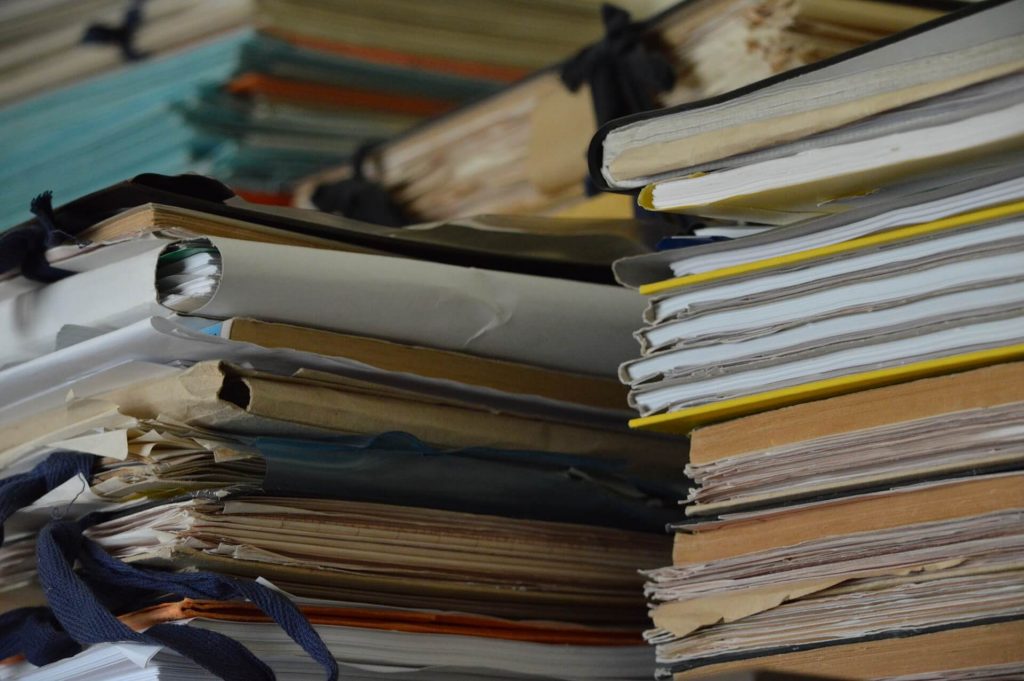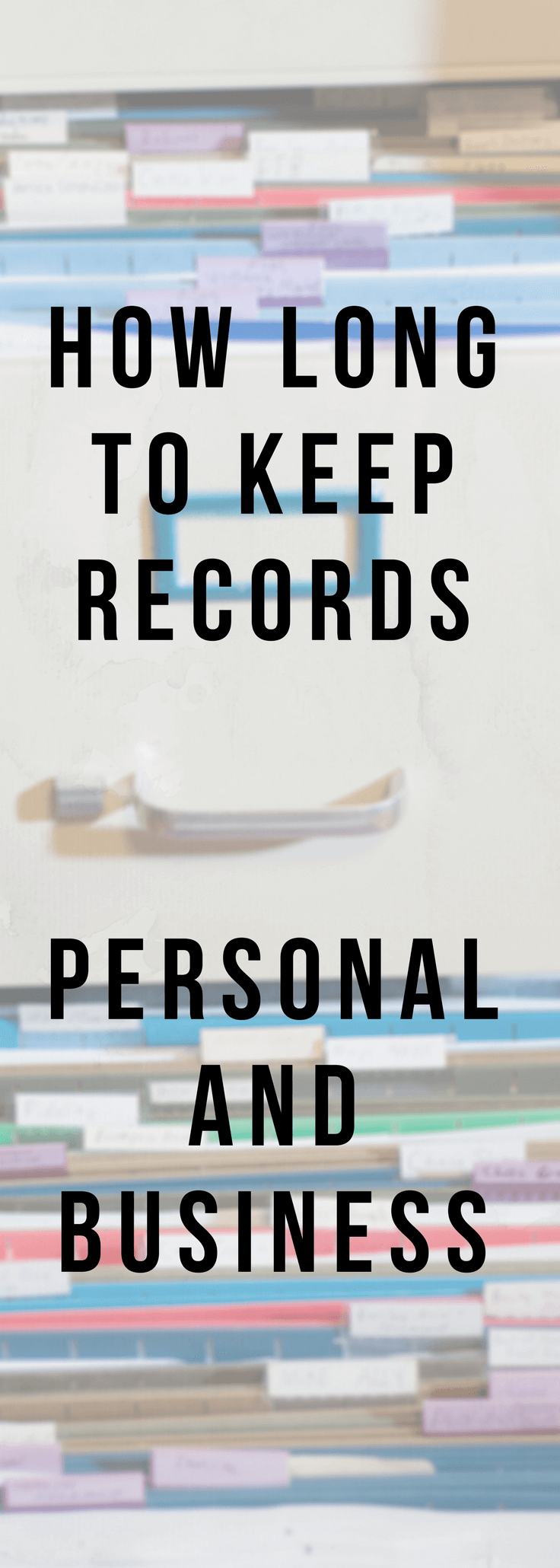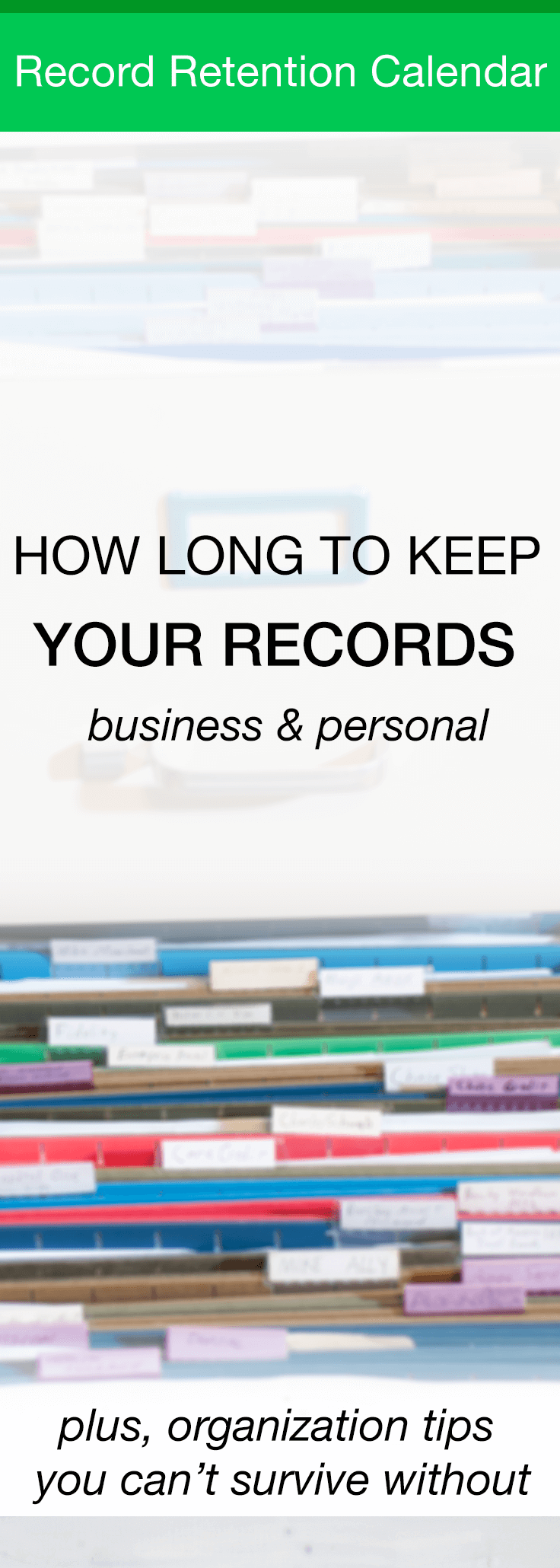This record retention schedule will guide you how long to keep records for all manners of receipts and paperwork. The schedule is organized by length of time to keep records or by the type of documents.

I used to have boxes upon boxes of documents. I had no idea what I actually needed or not, so I eventually put together a list and had it looked over by some industry professionals that deal with sorting through all sorts of documents.
This record retention schedule has been checked and verified by a California based CPA, Tennessee based CPA, and California based estate planner.
I’ve been updating and maintaining this list for several years now and it has been personally immensely helpful in staying organized.
Table of Contents
Keeping Records for Investments or Property Assets
Generally speaking, for any property or investments you own, you’ll want to keep all records related to your assets for 3 years from beyond when you sell your assets. These records are essential to figure any depreciation, amortization, or depletion deduction and to figure the gain or loss when you sell or otherwise dispose of the asset.
If you received an asset in a nontaxable exchange, your basis in that property is the same as the basis of the asset you gave up, increased by any money you paid. You must keep the records on the old asset, as well as on the new asset, until the period of limitations expires for the year in which you dispose of the new asset.
Property assets can also include your crypto investments, or virtual currencies.
Keeping Records for the IRS

You’ll want to cross reference record retention with the state you live in as well as the IRS, as some states have longer periods for different types of records.
- Keep records for 3 years if situations (4), (5), and (6) below do not apply to you.
- Keep records for 3 years from the date you filed your original return or 2 years from the date you paid the tax, whichever is later, if you file a claim for credit or refund after you file your return.
- Keep records for 7 years if you file a claim for a loss from worthless securities or bad debt deduction.
- Keep records for 6 years if you do not report income that you should report, and it is more than 25% of the gross income shown on your return.
- Keep records indefinitely if you do not file a return.
- Keep records indefinitely if you file a fraudulent return.
- Keep employment tax records for at least 4 years after the date that the tax becomes due or is paid, whichever is later.
Electronic Storage of Documents
According to the IRS policy and documentation, all electronic storage retention periods should match physical copies. Whther its on paper or a PDF, the retention period is the same.
Personal Record Retention Periods In Retention Period Order
Permanent Records
- Birth certificates
- Correspondence – Legal and important matters
- Custody agreements
- Death certificates
- Divorce papers
- Employment taxes for household employees (records and returns)
- Existing insurance records
- IRA contributions
- Marriage certificates
- Retirement and pension records
Two Years
- Bank reconciliations
- Duplicate deposit slips
Four Years
- Insurance policies which have expired
Six Years
- Bank statements
- Credit card statements
Seven Years
- Canceled stock and bond certificates
- Home and home improvements – including closing papers, purchase and sales invoices, proof of payment, insurance papers, Form 2119
- K-1’s from partnerships, trusts, S-corps
Personal Record Retention Periods In Alphabetical Order
| Bank reconciliations | Two Years |
| Bank statements | Six Years |
| Birth certificates | Permanent |
| Canceled stock and bond certificates | Seven Years |
| Correspondence – Legal and important matters | Permanent |
| Credit card statements | Six Years |
| Custody agreements | Permanent |
| Death certificates | Permanent |
| Divorce papers | Permanent |
| Duplicate deposit slips | Two Years |
| Employment taxes for household employees (records and returns) | Permanent |
| Existing insurance records | Permanent |
| Home and home improvements – including closing papers, purchase and sales invoices, proof of payment, insurance papers, Form 2119 | Seven Years |
| Insurance policies which have expired | Four Years |
| IRA contributions | Permanent |
| K-1s from partnerships, trusts, S-corps | Seven Years |
| Marriage certificates | Permanent |
| Retirement and pension records | Permanent |
Business Record Retention Periods In Retention Period Order
Permanent Records
- Appropriate ledger and related end of year trial balances
- Cancelled checks for payment of taxes, purchase of property, and in payment of important contracts should be retained permanently with the papers in these files
- Capital stock and bond records
- Ledgers, transfer registers, stubs showing issues and record of interest coupons Cash books (receipts and disbursement journals)
- Deeds, mortgages, and bills of sale, contracts and leases in effect
- Depreciation schedules
- Employment taxes (records and returns, including withholding statements)
- Financial statements – Year end (others optional)
- General and private ledgers, and related end of year trial balances Insurance records (existing)
- Minute books of directors and stockholders, by-laws
- Patents and related papers
- Property appraisals by outside appraisers
- Property ledgers – including costs, depreciation reserves and end of year trial balances Tax returns and worksheets, Revenue Agent’s reports and other documents relating to determination of tax liability Trade mark registrations
One Year
- Correspondence of unimportant nature with customers or vendors
- Purchase orders (except purchasing department copies)
- Receiving sheets
- Requisitions
- Stenographers’ note books Stockroom withdrawal forms
Three Years
- Employment applications
- General correspondence
- Internal audit reports, including working papers
- Miscellaneous internal reports
- Petty cash vouchers
- Physical inventory tags
Four Years
- Insurance policies which have expired
Seven Years
- Accident reports
- Accounts receivable ledgers and related trial balances
- Bank reconciliations
- Bank statements
- Canceled checks (see exception under permanent records) Contracts and leases expired
- Duplicate deposit slips
- Expense analyses and expense distribution schedules
- Garnishments
- Inventory summaries of product, materials and supplies
- Invoices to customers and from vendors
- Journal vouchers
- Notes receivable ledgers and related trial balances
- Payroll records and summaries, including payments to pensioners
- Personnel files (terminated)
- Purchase orders (purchasing department copies)
- Sales records
- Scrap salvage records
- Inventories, sales, etc.
- Subsidiary ledgers to the general ledger and related trial balances
- Time books
- Voucher register and related trial balances
Business Record Retention Periods In Alphabetical Order
| Accident reports | Seven Years |
| Accounts receivable ledgers and related trial balances | Seven Years |
| Appropriate ledger and related end of year trial balances | Permanent |
| Bank reconciliations | Seven Years |
| Bank statements | Seven Years |
| Canceled checks (see exception under permanent records) | Seven Years |
| Canceled checks for payment of taxes, purchase of property, and in payment of important contracts should be retained permanently with the papers in these files | Permanent |
| Capital stock and bond records: Ledgers, transfer registers, stubs showing issues and record of interest coupons | Permanent |
| Cash books (receipts and disbursement journals) | Permanent |
| Contracts and leases expired | Seven Years |
| Correspondence of unimportant nature with customers or vendors | One Year |
| Deeds, mortgages, and bills of sale, contracts and leases in effect | Permanent |
| Depreciation schedules | Permanent |
| Duplicate deposit slips | Seven Years |
| Employment applications | Three Years |
| Employment taxes (records and returns, including withholding statements) | Permanent |
| Expense analyses and expense distribution schedules | Seven Years |
| Financial statements – Year end (others optional) | Permanent |
| Garnishments | Seven Years |
| General and private ledgers, and related end of year trial balances | Permanent |
| General correspondence | Three Years |
| Insurance policies which have expired | Four Years |
| Insurance records (existing) | Permanent |
| Internal audit reports, including working papers | Three Years |
| Inventory summaries of product, materials and supplies | Seven Years |
| Invoices to customers and from vendors | Seven Years |
| Journal vouchers | Seven Years |
| Miscellaneous internal reports | Three Years |
| Minute books of directors and stockholders, by-laws | Permanent |
| Notes receivable ledgers and related trial balances | Seven Years |
| Patents and related papers | Permanent |
| Payroll records and summaries, including payments to pensioners | Seven Years |
| Personnel files (terminated) | Seven Years |
| Petty cash vouchers | Three Years |
| Physical inventory tags | Three Years |
| Property appraisals by outside appraisers | Permanent |
| Property ledgers – including costs, depreciation reserves and end of year trial balances | Permanent |
| Purchase orders (except purchasing department copies) | One Year |
| Purchase orders (purchasing department copies) | Seven Years |
| Receiving sheets | One Year |
| Requisitions | One Year |
| Sales records | Seven Years |
| Scrap salvage records – Inventories, sales, etc. | Seven Years |
| Stenographers’ note books | One Year |
| Stockroom withdrawal forms | One Year |
| Subsidiary ledgers to the general ledger and related trial balances | Seven Years |
| Tax returns and worksheets, Revenue Agent’s reports and other documents relating to determination of tax liability | Permanent |
| Time books | Seven Years |
| Trademark registrations | Permanent |
| Voucher register and related trial balances | Seven Years |
Tips on Organizing Your Paperwork
Making the effort to get organized and cohesively consistent supplies up front is helpful psychologically and can provide strong visual cues when organizing.
The cornerstone of my organization is in a vertical filing cabinet. I use a 4 drawer filing cabinet, but a 3 drawer would work as well for my methods. One drawer holds everything related to the house, from appliances to house-related bills such as energy or internet. The second drawer is for all business related paperwork. The third is for all personal related paperwork. The four is a miscellaneous file for things that are specific to me as a person, such as gardening notes or pamphlets with inspirational graphic design.
For current documents stored in the filing cabinet, I use a combination of hanging file folders in different colors based on the content category as well as washi tape for quick relabeling or notes inside the folder.
I archive paperwork over a year old. Once a year, right after I finish taxes, I go through my files and place everything from the prior year, from personal to business, into a manilla folder with the year and contents written on the tab. Each year gets its own box, which then goes into storage into the garage. I have 11 weathertight plastic boxes which protect from moisture and dust. Inside each box is a silica packet to absorb moisture and keep papers from molding over the next 10 years. These color changing packets provide a visual cue if there is too much moisture in the box and can be “recharged” which is super nice.
The 11th is for permanent documents that I will never purge. The other 10 boxes have a scrap piece of paper inside with the year facing outwards for me to quickly see which year I am handling. I shred the 10th year and replace its contents with the current year I am archiving. After several years of this, my system has worked pretty nicely and seamlessly.
I actually ignore most of the year guidance on my schedule and keep things for either 1 year or 10 years. I have a lot of paperwork and it just makes my time and energy simpler. For people with less paperwork or less room than I have, purging as recommended will save a ton of space. I could probably minimize down to 3 or 4 boxes total if I was diligent about taking my own advice.
Additional Business Resources
MirrorWeb – For businesses who need experts in digital compliance and secure online document retention.


- About the Author
- Latest Posts
I strive to paint vivid landscapes with my words, bringing the magic of far-off lands and enchanting aromas to life for my readers. Combine passion for exploration and the art of gastronomy in an unending ode to the senses. When I’m not traversing the globe, I find solace in the earth beneath my fingertips, tending to my garden and working on projects around my verdant oasis. MK Library serves as a beacon, guiding fellow travelers and homebodies alike to embrace sustainability, nurturing both our planet and our souls with purpose. Full Bio.


I love how detailed this blog post is! I’m not good in organizing documents and there are lots of docs as well that needs to be shredded that I haven’t yet. This is really helpful though!
This all is wonderful information, I really haven’t seen a post like this, so great job! I always have the tendency to not want to get rid of anything for the reason of just not knowing, so this was really helpful, thanks!! 🙂
-Madi xo | http://www.everydaywithmadirae.com
thanks so much for sharing this is very important information and I also shared on my personal facebook so that all can have the information as well thank you
I was always curious about the length of time with some of these items. I had heard 7 years before, but never confirmed. What a great reference piece you assembled here.